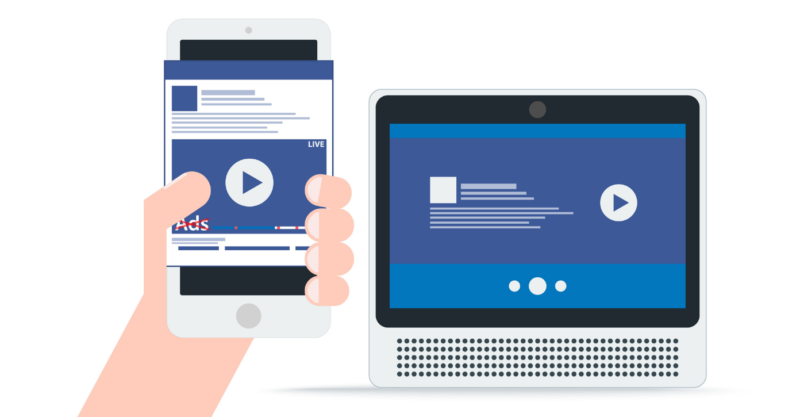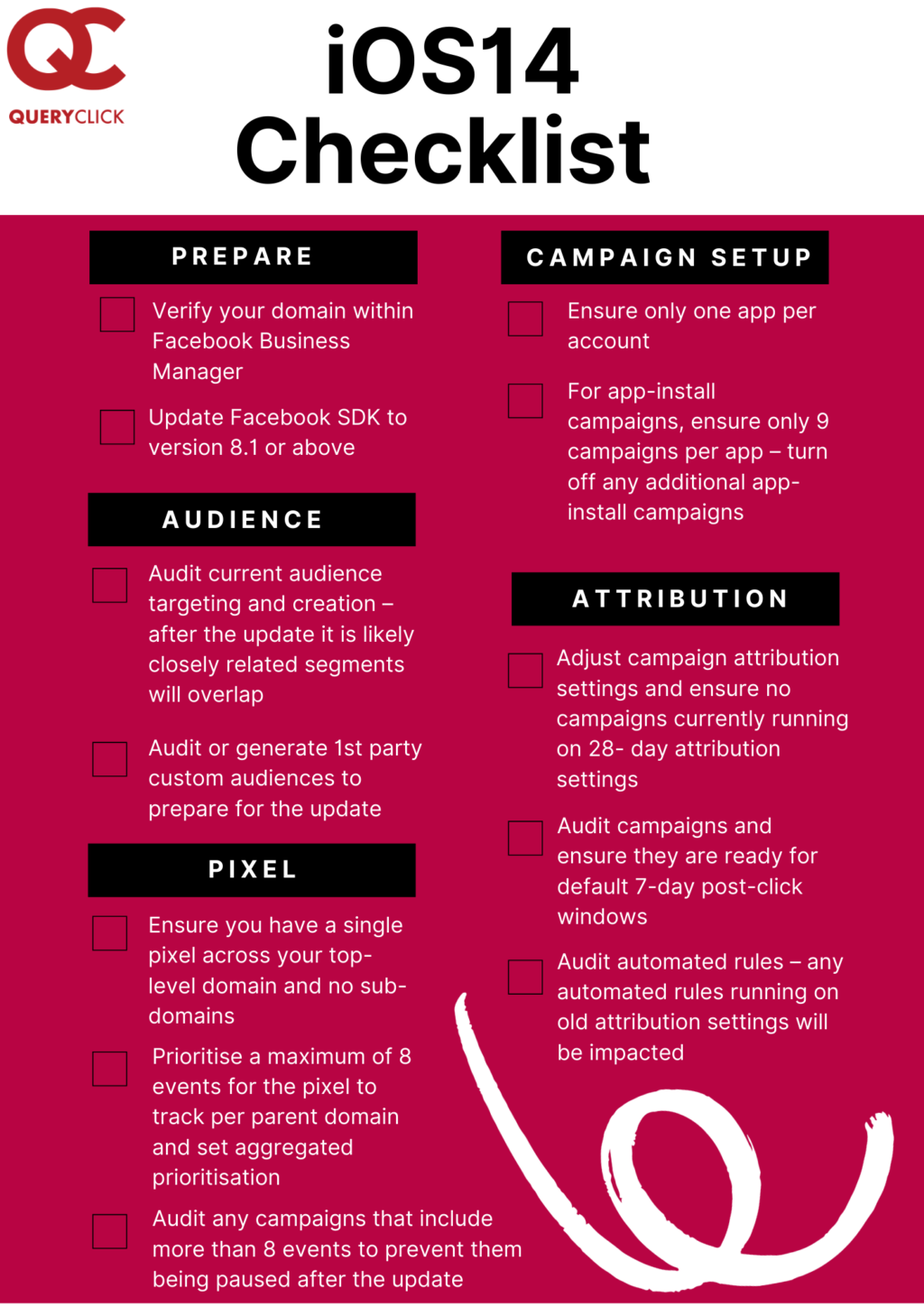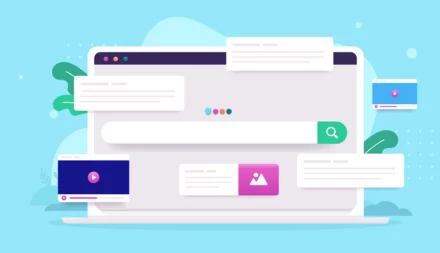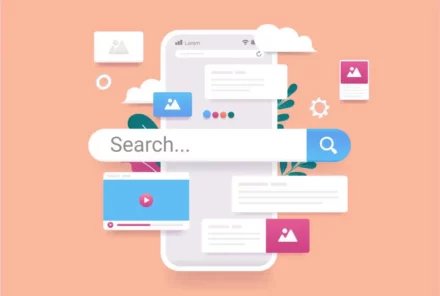What the iOS14 Privacy Update Means for Your Facebook Ads

Advertising on Facebook is about to become significantly more complex following the Apple iOS14 update coming during the week of 26th April 2021.
Apple is releasing a new privacy function in iOS14 meaning that users will now have to give opt-in permissions for apps and websites to track them or to access their Apple device advertising identifier (IDFA).
All current Facebook campaigns use IDFAs to track events and conversions coming from Apple devices. Android devices are unaffected by the change. However, Facebook has announced that it will be using the same system for all devices meaning that your campaigns will be impacted by this change.
The update will see users having a pop-up notification on newly installed versions of iOS14 that ask the user to allow tracking (opt-in) or choose not to track (opt-out). This has huge ramifications for Facebook’s audience targeting, with users falling into either category of audience.
But all is not lost. Here are some steps you can take to ensure your Facebook ads can continue to perform despite these new changes…
Reporting & measurement concerns
Advertisers will still receive current data and conversion reporting for opted-in users, so nothing much changes in data and reporting for these users. However, for opted-out users, Facebook will be unable to track those individuals and advertisers will not be able to access Facebook’s demographic data for them. This will lead to huge implications for targeting, reporting, and measurement.
Advertisers will only receive aggregated data across opted-out users for a single event, which can have a lag time of up to 3 days to show in the interface.
Retargeting is also prohibited on opted-out users meaning advertisers will not be able to retarget opted-out users with Facebook ads or using behavioural data as is the norm at the moment.
What advertisers need to do
To prepare campaigns for the update, advertisers should take action now. There are several key changes across pixel setup, event prioritisation, and campaign structure that must be addressed.
App-install campaigns
Advertisers running app-install campaigns will be the hardest hit. The update will restrict these types of campaigns severely. Facebook has announced that:
- only 1 app will be allowed per account
- only 9 campaigns will be allowed per app
- only 5 ad sets per campaign.
This means advertisers promoting multiple apps, or larger scale app-install campaigns, will have to rethink their approach and prepare campaigns for the update. Advertisers using the Facebook SDK will also need to prepare by updating to version 8.1 or later.
Pixel changes
Facebook has also had to change the way pixels are managed: no longer will you be able to assign multiple pixels across specific domains or subdomains.
Instead, only a single pixel can be placed across a top-level domain and sub-pages.
This has implications for advertisers that use sub-domains to split activity, for instance by different countries.
Advertisers that want to continue this level of activity and granularity in multi-country targeting may need to split out top-level domains or move to a single set of events across all markets.
Event tracking
Another key update is the way pixel events require amending to meet the new Apple privacy framework.
After the iOS14 update, advertisers will only be allowed to track a maximum of 8 events through their pixels; previously, advertisers have been able to track any number of different events to aid their campaign optimisation and reporting.
Campaigns that have not been limited to 8 events by the time of rollout will be automatically paused by Facebook, and any amends to the pixel events after the update will take 3 days to process on Facebook’s end making reporting and data highly inaccurate.
This means that advertisers should act now to ensure that appropriate events are set up and prioritised in order of how important they are to reporting and campaign management.
Users who are opted-in will have data for all events, however for users who have opted-out Facebook will only provide a single event at the top of the list as aggregated information.
It is crucial to prioritise the most important event as your aggregated event information to make sure you can report on conversions and key actions from your campaigns for opted-out users.
We recommend setting the following set of events in priority:
- Purchase (OR) Registration Completed
- Payment Started
- Purchase Started
- Add to Cart
- Views Cart
- Views Product Page
- Views Category Page
- Views Home Page
Attribution windows
Facebook has long provided the ability for advertisers to use 28-day lookback windows for attribution settings, alongside 1 and 7-day click post-click and view through.
With the update, Facebook will be removing the ability to use 28-day post click and view through attribution settings. Facebook will be defaulting attribution to a 7-day post-click at campaign level instead of account level.
For opted-in users, Facebook will still provide full attribution data for 1-day and 7-day windows with partial post-click and view through data.
For opted-out users, attribution data is limited to 1-day post click and partial view through data and 7-day post-click data. Consequently, advertisers will no longer be able to see view through data on 7-day settings for opted-out users.
There are further implications for audience targeting for opted-out users: the limitations of event tracking and demographic data will ultimately mean that users who were in a single targeting segment will now potentially overlap with multiple audiences.
Advertisers should review their audience setup and if possible, use 1st party data to develop new audience segments.
Discover how to unbundle your Google and Facebook Ads data for successful attribution…
In summary
It is unknown at this point just how many users will opt-out from Apple tracking, however we know that iOS users make up a sizeable chunk of Facebook ad views and are predicting this will have a huge impact on the ability of advertisers to generate results from Facebook.
Our team advises using the following checklist to prepare ad accounts for the upcoming update:

Let’s talk about your Paid Media campaigns
Own your marketing data & simplify your tech stack.
Have you read?
I have worked in SEO for 12+ years and I’ve seen the landscape shift a dozen times over. But the rollout of generative search engines (GSEs) feels like the biggest...
As you will have likely seen, last week Google released the March 2024 Core Algorithm Update. With it, comes a host of changes aiming to improve the quality of ranking...
After a year of seemingly constant Google core updates and the increasingly widespread usage of AI, the SEO landscape is changing more quickly than ever. With this rapid pace of...


